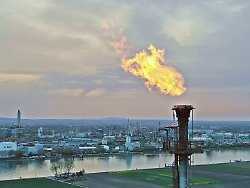20 percent more is possible
CDU Economic Council wants more domestic natural gas
04/16/2022 06:59 am
In order to become less dependent on Russian energy imports, German politicians are currently examining many options. The CDU Economic Council advocates an increase in natural gas production in Germany, and cooperation with the Netherlands is brought into play.
The debate about expanding natural gas production in Germany is gaining momentum. The Secretary General of the Economic Council of the CDU, Wolfgang Steiger, said with regard to the dependence on Russian energy imports: “In the current situation, all options must be on the table.” This also applies to greater use of German deposits. “Of course, we cannot fully compensate for Russian imports with domestic natural gas production, but it would be an important building block for greater independence.” A short-term increase in the current funding by 20 percent would be possible and should be done immediately, according to Steiger.
“Even then, at six billion cubic meters, our domestic production is still just a tenth of what we import from Russia, but that too is a step in the right direction.” There are also untapped reserves. “Sixty billion cubic meters of natural gas are stored off the German-Dutch coast. That’s as much as we import from Russia in one year,” says Steiger. “The Dutch want to open up the supplies – only the German side is reluctant.” Due to higher standards, the promotion would even be more environmentally friendly than importing from Russia,” said Steiger.
The Dutch company One-Dyas wants to build a gas production platform near the Wadden Sea on the German sovereign border near Borkum, which should be able to produce around two billion cubic meters of gas annually. The red-black state government in Lower Saxony initially positioned itself against the project last summer, but is now in favor of a reassessment. According to the Federal Association of Natural Gas, Oil and Geoenergy, 5.2 billion cubic meters of natural gas were produced in Germany last year, exclusively onshore – i.e. inland, by far the most of it in Lower Saxony.
Lindner demands gas and oil production in the North Sea
Federal Finance Minister Christian Lindner is also committed to gas and oil production in the North Sea. “To put it bluntly: I think the coalition agreement’s stipulation that we no longer want to produce oil and gas in the North Sea and do not want to explore new fields is out of date,” he told The European magazine.
Environmental groups are against natural gas production in the North Sea. With regard to One-Dyas’ application, NABU, for example, explained that the intended location of the production and processing platform borders directly on the Lower Saxony Wadden Sea National Park, which enjoys special protection as a natural world heritage site.
Steiger also warned of an embargo on Russian deliveries. “The termination of existing energy contracts would have dramatic consequences for industrial and private consumers in Germany and Europe.” There is a lot of discussion about natural gas. “We shouldn’t be naïve when it comes to unilateral terminations of coal and oil deliveries from long-term, low-cost contracts: Russia could even benefit from this.” The country could then sell the released quantities at higher prices on the world market. “But our energy suppliers would have to pass on the increased world market prices of other suppliers to the end consumer.”
